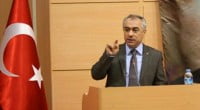Separate state and religion

Date posted: December 7, 2014
Why is it that in Turkey today cemevis, the houses of worship of Alevis — the largest religious minority in the country — are not recognized as such?
Why does a Sunni prime minister lecture Alevis on what Alevism is and is not? Why are religion courses that teach an official government version of Islam compulsory for all students irrespective of religious faith? Why does the Directorate of Religious Affairs, the state institution that monopolizes religion, behave as a mouthpiece for the government?
Why have the religious brotherhoods of Sufism, the people’s Islam, remained outlawed ever since 1925? Why does the National Security Council (MGK), bringing together civilian and military leaders, continue to make decisions to carry out the mass profiling of members of religious groups? Why are religious groups denied a legal personality? Why has Fethullah Gülen, the religious scholar who teaches the most tolerant and democracy-friendly type of Islam, been forced to reside in the United States since 1999? How can Justice and Development Party (AKP) leader President Recep Tayyip Erdoğan, who calls members of the faith-based social movement, Hizmet, inspired by Gülen, “terrorists and assassins,” escape prosecution for hate speech? Why are non-Muslims excluded from public service, and why has the Halki seminary that trains the Greek Orthodox clergy been closed since 1971? If I go further back in time, the questions may get increasingly scary. So it is better I respond to those already posed above.
The root cause of all the anomalies is to be found in the founding philosophy of the Republic of Turkey. The founding fathers, Mustafa Kemal Atatürk, and his followers, Kemalists, were highly influenced by 19th century European positivistic and materialistic philosophy. They believed that religion and particularly Islam was an obstacle to progress, to socioeconomic development. They also believed that modernization would lead to the withering away of religion and its replacement with science. With those convictions they constructed a highly authoritarian kind of secular regime inspired by the French model and properly called it laicism. Since it was impossible to decree away Islam, they put it under state monopoly and control and introduced restrictions on religious freedoms with the aim of confining religion to individual consciences.
This authoritarian system has caused much suffering for believers as well as nonbelievers. Perhaps one of the worst consequences of the system is being experienced today, when the AKP government, using Islamic populism to stay in power, is attempting to impose its own understanding of Islam on society through the education system.
Those who still support the current system of the relationship between state and religion in Turkey need to understand that the world has changed much since the time of Atatürk. Modernization has not led to secularization or the withering away of religion. The world is as religious as it ever was, with perhaps Western Europe being the only exception. Modernization has instead led to pluralization, as the most prominent sociologist of religion Peter Berger has best explained, in the sense of growing choices for individuals, including choice of religious beliefs. In the postmodern age it is no longer possible to impose uniformity on societies in any sense of the term.
The argument that religion is an obstacle to modernization has been discarded. The most modernized country in the world, the United States, remains highly religious. The argument that religion in principle is against peace, basic rights and democracy has also proven unfounded. There are many different interpretations of religions, including Islam, some of which reject modernity, however most adopt it. The vast majority of Muslims support peace, basic rights and democracy, as indicated by the findings of the World Values Survey. Those who lend support to fundamentalist Islam or the radical, violent kind of political Islam clearly form marginal groups among Muslims.
Turkey needs to face the fact that experience gained over the course of almost a century has shown that the marriage of state and religion is detrimental to both. If Turkey is to ever consolidate a liberal and pluralist kind of democracy, state and religion need to be separated, and freedom for believers and nonbelievers alike has to be secured.
Source: Today's Zaman , December 07, 2014
Tags: Alevi issue | Hizmet and politics | Peacebuilding | Turkey |
























